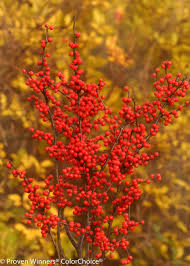Winterberry Reds
Looking for a stunning shrub to be a highlight in the winter landscape? Winterberry is a solid contender.

Berry Heavy
Ilex verticillata, commonly called winterberry, is a deciduous holly that is native to North America where it typically occurs in swamps, damp thickets, low woods and along ponds and streams. So she’s a natural for saturated areas in the Midwest like rain gardens and bioswales.
Quickly recognized by the brilliant, red berries that persist throughout winter, the varieties pictured here are ideal for the residential garden. Unlike their cousins that grow to a mature height of up to 15 feet, the smaller winterberry will grow to only four to eight feet tall, keeping a round or mounded shape.
She’s not fussy about soil, and grows easily in average, acidic, medium to wet soils. In full sun to part shade winterberry will flourish. Adaptable to both light and heavy soils, but generally prefers organic loams.
Low maintenance? Oh yes! Pruning isn’t necessary unless removing dead or broken branches, and it’s best done in late winter or early spring just before new growth appears.
Winterberries are dioecious (separate male and female plants). Only fertilized female flowers will produce the attractive red berries that are the signature of the species. Generally one male winterberry will be sufficient for pollinating 6-10 female plants.
You will treasure this plant as a spotlight in the garden, in mass plantings or cutting branches to use in a winter floral arrangement.
Even though the fruit is not edible for humans, dozens of our favorite songbird species use hollies for food, cover and nesting. Another benefit for those that like to invite more wildlife to their garden.
Also, according to the Humane Society of America Ilex berries can be toxic to pets. This is means that the plants are generally identified as having the capability for producing a toxic reaction.
To see Winterberry holly (Ilex Verticillata ‘Winter Red’) growing beautifully, visit the Kauffman Memorial Gardens (4800 Rockhill Rd., Kansas City, MO 64110).
When selecting plants for your landscape, seek the advice of professionals at your local nursery or garden center.
There’s plenty of holly information to discover at Holly Society of America, Inc. website: www.hollysocam.org, and search for this group on Facebook.
To view images of winterberry, visit the online version of the November 2016 issue at KCGMAG.com.
